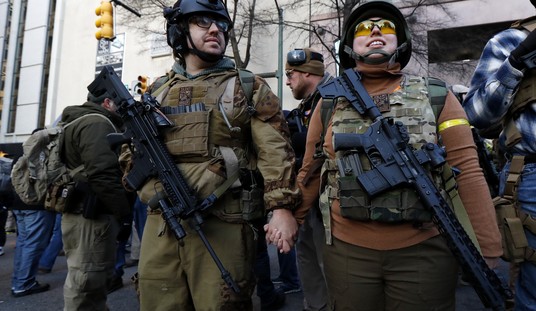The Supreme Court will release more opinions from this term on Thursday and Friday of this week, and one of the cases that could be handed down is U.S. v. Rahimi. The justices will be deciding whether it's a violation of the Second Amendment to bar those subject to a domestic violence restraining order from possessing a firearm, and based on the questions posed during oral arguments it seems like there's a decent chance that the Court will uphold Zachey Rahimi's conviction.
How the justices reach that decision may be almost as important as what they decide. According to Slate's Mark Joseph Stern, Justice Amy Coney Barrett may be getting ready to part ways with the "text, history, and tradition" test laid out by SCOTUS in the 2022 Bruen decision.
To back up his claim, Stern cites Barrett's recent concurring opinion in Vidal v. Elster, the "Trump Too Small" trademark case decided last week. While a unanimous court ruled against Steve Elster and his attempt to trademark the phrase, Stern says that Barrett used her concurrence to attack the similar test that Justice Clarence Thomas used in Vidal's majority opinion.
In a separate opinion, Barrett agreed with Thomas’ bottom line but sharply disagreed with pretty much everything else. His history-only approach, she wrote, was “wrong twice over”: Thomas both botched the relevant history and failed to make a persuasive case for its use in the first place. Start with “the court’s evidence.” Thomas’ law-office history, Barrett explained, consists of “loosely related cases from the late-19th and early-20th centuries” that do not “establish a historical analogue for the names clause.” His analysis of these cases is shallow and often dubious; Barrett highlighted unfounded inferences in Thomas’ skim of the historical record, questioning his generalizations from a handful of archaic decisions. She also noted that Thomas declined to “fully grapple with countervailing evidence,” citing old decisions that cut against his conclusory assertions.
Clearly, Barrett is growing tired of her colleague’s bogus originalism: She also criticized his highly selective frolic through the archives in last term’s Samia v. U.S., questioning his reliance on a somewhat random “snapshot” of history to cut back protections of the Sixth Amendment. “The court overclaims,” the justice wrote then, risking “undermining the force of historical arguments when they matter most.”
Stern claims that Barrett's opinion "reads like a rebuttal of Bruen", even though Barrett joined Thomas and four other justices in the majority that adopted the "text, history, and tradition" test. Has Barrett really undergone a sea change in opinion over the past two years?
There's no direct attack on Bruen in Barrett's concurrence. In fact, she noted that "tradition has a legitimate role to play in constitutional adjudication." But she also stated that "tradition is not an end in itself—and I fear that the Court uses it that way here."
Stern very well could be right about Barrett changing her mind on the "text, history, and tradition" text, but I'd caution about reading too much into her opinion in a First Amendment case and thinking it represents her views on how Second Amendment cases should be decided in the future, especially since the Supreme Court gave itself (and lower courts) some wiggle room in the Bruen test. While modern-day laws must comport with the text, history, and tradition of the Second Amendment in order to withstand a constitutional challenge, the Court held that "even if a modern-day regulation is not a dead ringer for historical precursors, it still may be analogous enough to pass constitutional muster."
For example, courts can use analogies to “longstanding” “laws forbidding the carrying of firearms in sensitive places such as schools and government buildings” to determine whether modern regulations are constitutionally permissible. That said, respondents’ attempt to characterize New York’s proper-cause requirement as a “sensitive-place” law lacks merit because there is no historical basis for New York to effectively declare the island of Manhattan a “sensitive place” simply because it is crowded and protected generally by the New York City Police Department.
Barrett's concurrence in Vidal v. Elster was definitely not a rebuttal to the outcome in Bruen, but I get how Stern (and others who are hopeful the Court will reverse course on 2A cases) could see it as a repudiation of the methodology. I would be shocked if the majority opinion in Rahimi throws out the "text, history, and tradition" test established way back in Heller and explicitly stated in Bruen, but I'm very curious to see if Barrett takes another swipe at using tradition as a deciding factor when Rahimi is handed down.









Join the conversation as a VIP Member